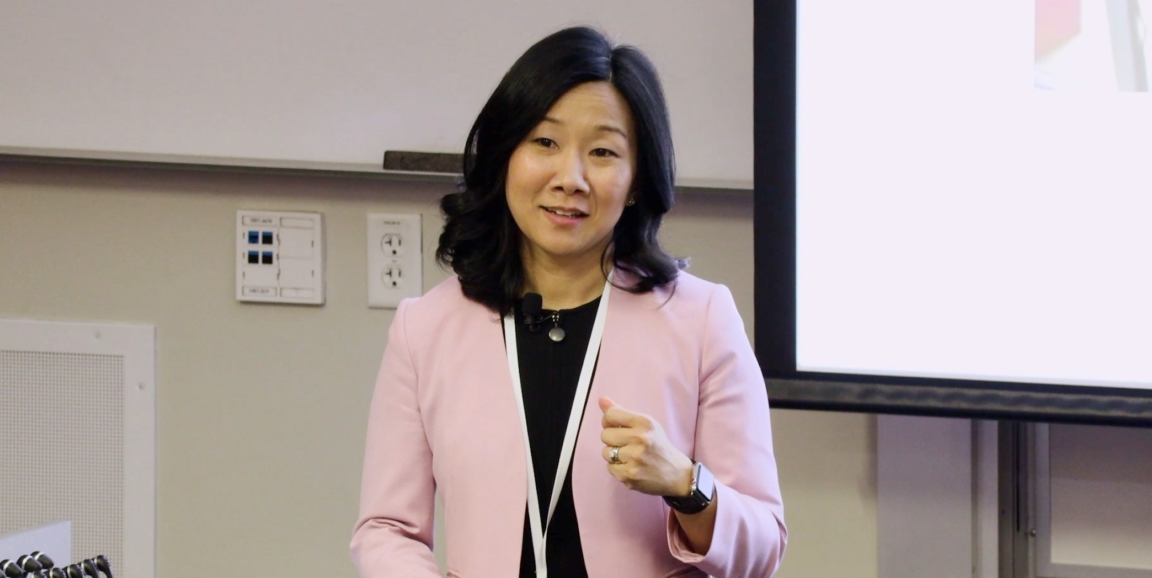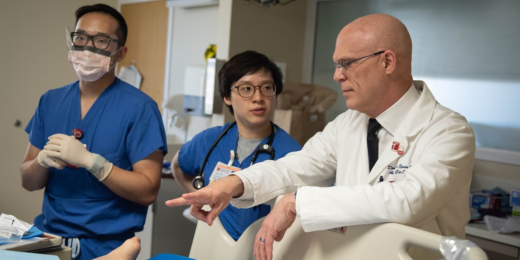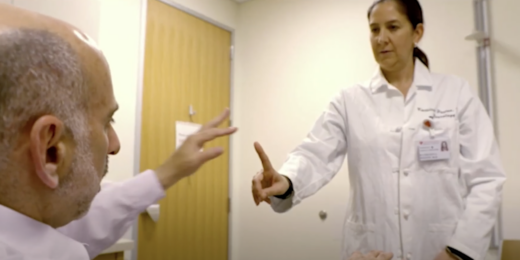A pervasive myth in medicine is that doctors shouldn't talk about death with their patients. But Stephanie Harman, MD, knows better. During her first week of medical school, Harman learned her father-in-law had stage 4 lung cancer.
"That was my first foray into learning how someone with a very serious illness receives care," said Harman, the founding medical director of palliative care at Stanford.
Harman and I recently sat together at a round table with a large candy dish in the middle. She looked out her window at people playing a game of volleyball on vibrant green, soggy grass. Flecks of rain clung to the waterproof coat Harman hadn't yet taken off after sprinting from the hospital to meet with me. She was smiling and seemed more concerned that I was comfortable (Did I want anything, water, coffee?). The rain splattered-coat was the only hint of any rush about her.
"He died when I was a second-year medical student." Harman told me.
Harman attended nearly all of her father-in-law's oncology appointments. Seeing severe illness from the viewpoint of a loved one made her realize how important it was for patients who have serious illness, or have illnesses that will lead to death, to talk with their doctors about their priorities and the end of life. She assumed she'd get training in this area during her clerkships.
"But, there wasn't any training around care for patients near the end of their lives, or on how to have conversations that were really hard," she said.
When I asked Harman why, she explained that the fields of medicine and technology have advanced quickly over the past century, but the culture and content of medical education have not kept pace.
Historically, Harman said, "there were a lot less life-sustaining and life-prolonging interventions. ... We couldn't think about someone living the rest of their life in a long-term acute care facility on a ventilator. ... That didn't exist."
Moreover, when Harman was in medical school, palliative care (compassionate care that provides relief from the symptoms and physical and mental stress of a serious or life-limiting illness) was just emerging as a medical specialty.
Driven by determination and curiosity, Harman learned to have end-of-life conversations with patients. She gained experience with clinical palliative care and home visits through an elective course she created as a medical student at Case Western Reserve School of Medicine. She also completed a palliative care fellowship at the Veterans Affairs Palo Alto Heath Care System.
When palliative care became a board-certified subspecialty of medicine in 2008, Harman became certified. She made it her mission to help medical students and doctors learn about the field.
So patients could have the kind of care she knew -- from her experience with her father-in law -- was vital, Harman co-founded the palliative care program at Stanford Health Care with clinical nurse specialist Judy Passaglia, and social worker, Sandy Chan.
Today, with new therapies and life-extending treatments available, there's a greater need to talk with patients about their priorities for the remainder of their lives, Harman explained.
But there's a common concern among doctors that talking about the end of life could hasten death or harm patients, she said. "As clinicians, we think we will take away all hope from patients and families by talking about what may happen, or what will happen," Harman said.
This isn't true, Harman explained. According to a study of newly diagnosed lung cancer patients, those who received early palliative care reported feeling better, having a better quality of life and mood, and living about 2½ months longer than patients who received standard care alone.
"I think we underestimate the receptivity and the resilience of our patients and families." Harman said.
"One thing we often do in palliative care is ask permission: 'Would it be OK if we talked a little bit about what the future holds?' ... The vast majority of both patients and their loved ones say yes. It helps them plan how they want to spend their time living. And those who say no may be just really tired that day. It's not always as profound as they can't face the prospect of their death or dying. Sometimes it's, 'Just not today. Today's not a good day.' Having a serious illness means that your energy is precious."
The patient conversation that's lodged in Harman's brain is the talk she witnessed between her father-in-law and his oncologist when she was a second-year medical student.
Her father-in-law had gone to Georgian Bay in Lake Huron every summer since he was 3 to spend time with his family. He wanted to return there, but the cancer in his lungs had spread to his brain and had grown.
Her father-in-law was a clear communicator, Harman said; a businessman used to discussing and weighing his options. In this case, the stakes were high -- he was asking his oncologist if he should do another line of chemotherapy that summer, or delay chemotherapy so he could go to Georgian Bay.
Understanding her father-in-law's priorities and how important the trip was to him, his oncologist advised him to go to Lake Huron that summer. He spent over a month with his family and died later that fall in hospice at home.
"There is deep suffering with serious illness," Harman said. "But there's a layer of unnecessary suffering that comes from the way we talk about -- or don't talk about -- what's happening. ... That has pushed me to get to those places where I can influence the way we care for patients who have serious illness, so they have control in the midst of a lot of things that they can't control."
For Harman, working in palliative care feels like it was meant to be.
"This is home for me, my clinical tribe," Harman said.
This is second in a series of Discussing Death blog posts designed to help people have more helpful and meaningful conversations about end of life care and death. The next blog will feature insight from Harman and Charles Prober, MD, founding executive director of the Stanford Center for Health Education.
Photo via Health Matters 2018






